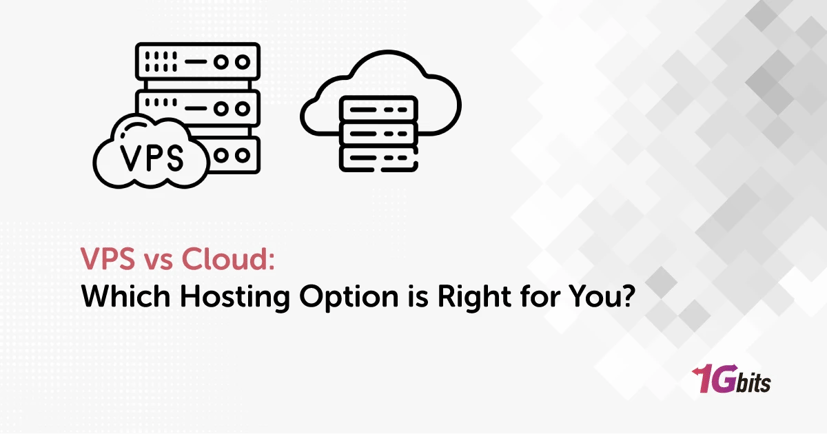Choosing the right hosting solution for your website or online project can be challenging. With so many options available, it's crucial to understand the differences between popular choices like VPS (Virtual Private Server) and cloud hosting. Both VPS and cloud hosting offer unique advantages, but they cater to different needs based on factors like budget, scalability, security, and performance. In this article, we'll dive deep into the "VPS vs cloud" debate, exploring how each option works, their strengths and weaknesses, and which one might be the best fit for your business.
☁️ What is Cloud VPS Hosting?
Before we compare VPS and cloud hosting, let's clarify what "Cloud VPS hosting" actually means. A VPS (Virtual Private Server) is a virtualized server that runs on a physical server but acts like a dedicated server. You get allocated resources like CPU, RAM, and storage that are exclusively yours, providing more control and flexibility than shared hosting. However, a Cloud VPS is a type of VPS that runs on a cloud infrastructure. Instead of being confined to a single physical server, it draws resources from a network of connected servers (the cloud), allowing for greater scalability and redundancy.
Cloud VPS combines the best of both worlds—offering dedicated resources like traditional VPS hosting while benefiting from the scalability and reliability of cloud computing. This means that if one physical server fails, your VPS can easily switch to another server in the cloud, minimizing downtime. Here, you can read more about VPS Advantages and Disadvantages.
For more insights into optimizing your cloud environment, consider exploring solutions like How to Install CloudLinux Server, which can enhance resource management and security within your VPS setup.
🆚 VPS vs Cloud: What’s the Difference?
🧠 1. How They Work
-
VPS Hosting: A VPS is a virtual server that’s partitioned from a physical server. Each VPS operates independently with its own dedicated resources like RAM, CPU, and storage. A hypervisor software allocates and manages these resources among various VPS segments. VPS hosting is ideal if you need more control and customization without the high costs of a dedicated server.
-
Cloud Hosting: Cloud hosting, on the other hand, uses a network of servers to store your website’s data. Instead of relying on a single physical server, cloud hosting pulls resources from a cluster of servers, providing flexibility and scalability. This setup allows websites to handle sudden traffic spikes more effectively and ensures higher uptime.
⚙️ 2. Flexibility and Customization
-
VPS Hosting offers a high level of control. You get root access to your server, enabling you to install custom software and configurations. This level of control is ideal for developers and businesses that need a customized environment.
-
Cloud Hosting is known for its flexibility. You can adjust your resources on-the-fly using an intuitive dashboard. It’s perfect for businesses that experience fluctuating traffic and need the ability to scale resources quickly.
💰 VPS vs Cloud Pricing
💸 Cost Comparison
When considering "VPS vs cloud" hosting, pricing is a critical factor. Both options offer a range of pricing plans to suit different budgets, but they differ in how these costs are structured.
-
VPS Hosting typically comes with fixed monthly plans, starting as low as $4-$5 per month. It’s more cost-effective for small to medium-sized businesses with predictable workloads. However, scaling a VPS may require upgrading to a higher plan or adding more servers, which can increase costs.
-
Cloud Hosting uses a pay-as-you-go model. This means you only pay for the resources you actually use. It’s great for businesses that need to handle varying traffic levels or require temporary bursts of power. However, it can become more expensive if you’re consistently using high amounts of resources.
📉 Which Option is Cheaper?
-
VPS is generally cheaper for smaller projects with stable traffic. You can buy VPS hosting from here.
-
Cloud Hosting offers better value for money if you need flexibility and scalability, especially for large projects with unpredictable workloads.
🖥️ VPS vs Cloud Computing
🏗️ Understanding the Infrastructure
Both VPS and cloud hosting are built on the principle of virtualization, where physical server resources are divided into virtual machines. However, they differ significantly in terms of their underlying architecture.
-
VPS Hosting is more like having a dedicated slice of a single physical server. You have fixed resources, which means your performance is predictable but limited by the physical server's capacity.
-
Cloud Hosting taps into a network of servers. It’s like having access to a virtually unlimited pool of resources. If one server in the cloud fails, another takes over seamlessly, which ensures better uptime and reliability.
For businesses seeking the ultimate in cloud infrastructure, understanding What is a Cloud Server can provide deeper insights into how these distributed systems offer unparalleled flexibility and reliability for modern applications.
🎯 Use Cases
-
VPS is best for projects that need consistent performance and have predictable resource needs, like running a business website or managing an e-commerce store. In this blog post, you can read more about VPS Uses and Use Cases.
-
Cloud Hosting is ideal for startups, large enterprises, or applications that experience traffic spikes and need on-demand scaling. For a broader overview of leading options, consider checking our comprehensive guide on the Top 10 Cloud VPS Providers in 2025 to see which providers align with specific business requirements and growth strategies.
📈 VPS vs Cloud Scaling
Scalability is where cloud hosting truly shines, offering unparalleled flexibility compared to traditional VPS setups.
-
Cloud Hosting provides easy scalability. You can adjust resources such as CPU, RAM, and storage instantly from a control panel. This makes it perfect for businesses that experience rapid growth or seasonal traffic spikes, allowing them to adapt without manual intervention.
-
VPS Hosting can also scale, but it’s more limited. Expanding resources often requires a hardware upgrade or even migrating to a more powerful server, which can be time-consuming and costly. It's less agile for dynamic workloads.
🏆 Which Option is More Scalable?
-
Cloud Hosting wins hands down when it comes to scaling. If you anticipate growth or fluctuating workloads, cloud hosting is the better choice due to its elastic nature.
-
VPS is suitable if your resource needs are stable and don’t change frequently, providing consistent performance for predictable applications.
🔒 VPS vs Cloud Server Security
Security is a top concern for businesses when choosing between VPS and cloud hosting. Both offer robust security measures, but their approaches differ based on their underlying architecture.
-
VPS Hosting offers a high level of security. Each VPS is isolated from others, which means your data is protected from other users on the same physical server. You get your own OS, configurations, and security settings, making it harder for attackers to breach your environment directly.
-
Cloud Hosting is secure too, but its security largely depends on the hosting provider’s protocols and the specific cloud model. Data is spread across multiple servers, which can increase redundancy but also expose you to potential security vulnerabilities if the provider's infrastructure is not properly secured, especially in public clouds. Private cloud hosting offers a more secure alternative, suitable for handling sensitive data.
A crucial element in securing any virtualized environment is the operating system itself. Understanding What is CloudLinux OS and its benefits can greatly enhance the stability and security of your hosting, particularly in shared and multi-tenant environments by isolating users and preventing resource abuse.
⏱️ VPS vs Cloud Hosting Availability
When it comes to availability and uptime, cloud hosting has a clear advantage due to its distributed architecture.
-
Cloud Hosting uses a cluster of servers, so if one server goes down, others take over automatically. This results in significantly higher availability and reliability, as there's no single point of failure.
-
VPS Hosting is dependent on the health of a single physical server. If that server fails, all the VPS segments on it will experience downtime, which can impact service continuity.
🚀 Which Option Offers Better Uptime?
-
Cloud Hosting is the winner for businesses that need high availability and minimal downtime, making it ideal for critical applications.
-
VPS can still offer good performance but may not be as resilient as cloud infrastructure in the face of hardware failures.
🌐 Web Hosting vs Cloud Hosting
It’s important to differentiate between standard web hosting and cloud hosting, as they serve different purposes and offer varying levels of resources.
-
Web Hosting typically includes shared hosting, where multiple websites share the same server resources. It’s affordable but offers limited performance and scalability, making it suitable for small websites with low traffic.
-
Cloud Hosting is a more advanced form of hosting that uses multiple servers to provide resources. This allows for better performance, scalability, and reliability compared to traditional web hosting, adapting to fluctuating demands.
⚖️ VPS vs Cloud vs Dedicated
Let’s see how VPS and cloud hosting stack up against dedicated servers to understand the full spectrum of hosting solutions.
-
Dedicated Servers offer the highest level of control, customization, and performance, as you get an entire physical server. However, they are also the most expensive and require more maintenance and technical expertise.
-
VPS Hosting offers a middle ground. You get dedicated resources within a shared physical server without the high costs and maintenance burden of a full dedicated server.
-
Cloud Hosting is the most scalable and flexible option, suitable for businesses of all sizes. It’s perfect for handling unpredictable workloads and scaling resources dynamically, offering a pay-as-you-go model.
For more information on the distinctions and benefits of different server types, check our blog about Dedicated Server Vs VPS Hosting. This guide delves deeper into the specifics of each option, helping you make an informed decision based on your unique requirements.
📝 Conclusion: Making the Right Choice
Choosing between VPS and cloud hosting depends on your specific needs. If you want more control, dedicated resources, and a stable environment for predictable workloads, VPS hosting might be the right choice. On the other hand, if scalability, flexibility, and high availability are more important, cloud hosting is the way to go.
Both VPS and cloud hosting have their strengths and can cater to different business requirements. Understanding these differences can help you make an informed decision that aligns with your business goals and budget. If you’re also wondering about the differences between VPS vs VDS, you can read our article on this topic. Whether you're looking for an affordable cheap VPS plan, a trial VPS to test our services, flexible VPS rental options, or want to choose from multiple VPS locations worldwide, 1Gbits has you covered with customizable solutions to match every need.










